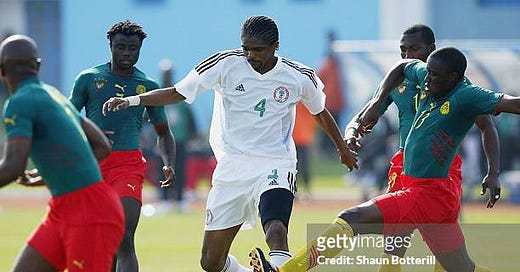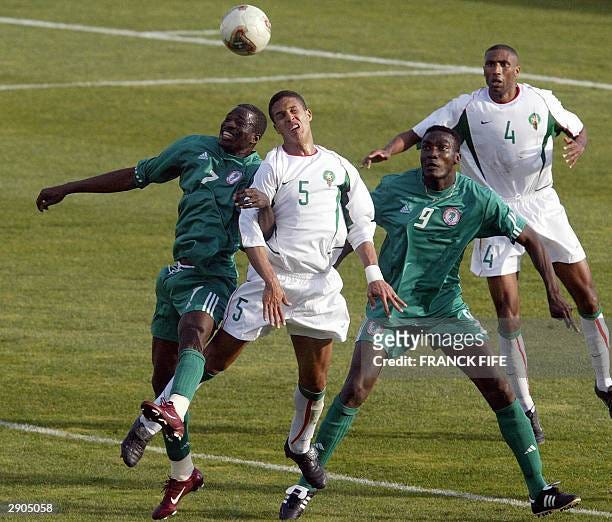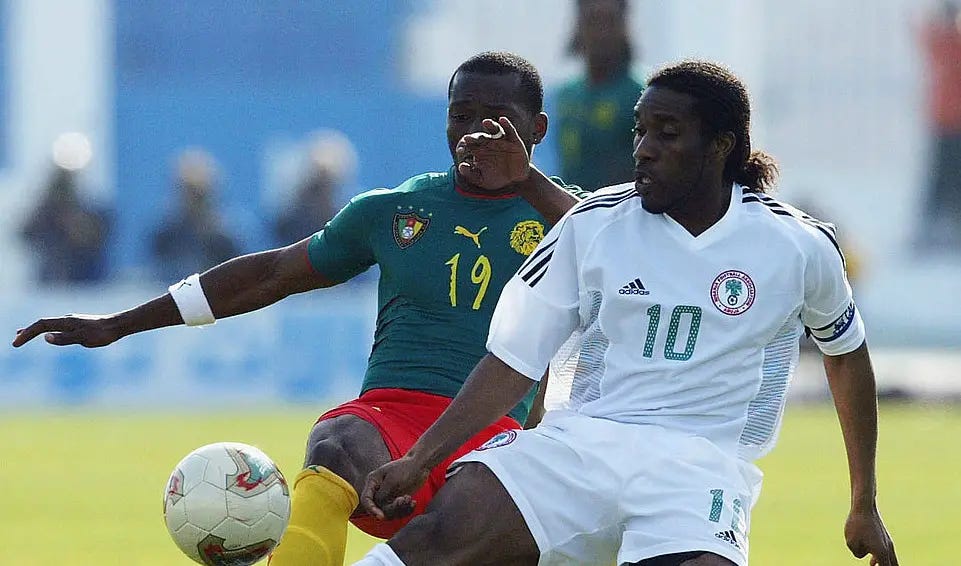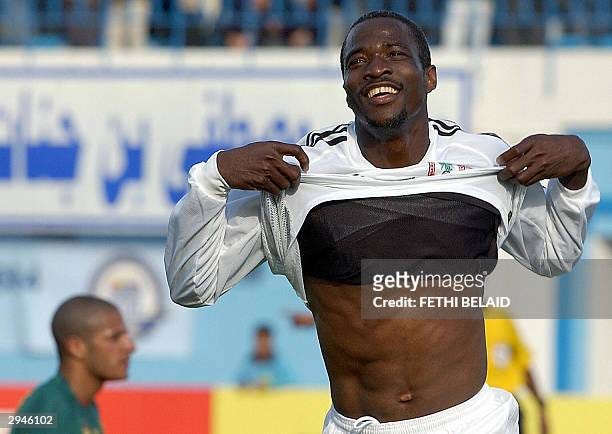Classic 21st century Super Eagles performances: 2004 AFCON QF vs Cameroon
This is the third of a 10-part series examining some of the best performances (in no particular order) by the Nigeria men’s national team over the first two decades of the 21st century i.e. from January 1, 2001 to December 31, 2020.
This strictly covers competitive internationals, so there is no place for, say, Nigeria’s friendly wins over Argentina in 2011 and 2017, or the win against France in 2009.
This entry is from the 2004 Africa Cup of Nations, and is a tale of revenge and emotional release.
Date: February 8, 2004
Venue: Stade Mustapha Ben Jannet, Monastir
As far as marquee Africa Cup of Nations confrontations go, they don’t come much bigger (or fiercer) than Cameroon vs Nigeria.
The history between these two teams in the competition has been fraught: trepidation, controversy and heartache attending their meetings in generous measure, and neither side exactly looking forward to the next edition.
While Nigeria holds a 12-7-4 record against their next-door neighbours, the tale of the tape at the AFCON – specifically in finals – has been of woe. Of Cameroon’s five continental triumphs, three have come by way of victory over Nigeria in the showpiece match.
As such, when Morocco drew with South Africa to top Group D at Nigeria’s expense at the 2004 tournament, there were audible groans from Abuja to Yaounde. Another installment of the famous rivalry had been set up.
There was reason for apprehension on both sides of the border.
For Nigeria, there was obviously the negative mental association, as well as the fact that Cameroon were reigning champions and gunning for a three-peat, a feat unprecedented at the time. That aside, the Super Eagles had laboured during the competition to that point. A haphazard preparation was duly rewarded with defeat at the hands of Morocco in the opening game, before the team rallied to win the remaining group matches without thoroughly convincing.
Furthermore, three players had been culled by Christian Chukwu for breaking camp rules, two of them – Yakubu Aiyegbeni and Victor Agali – strikers. That had drastically shrunk the pool of options to choose from, an inconvenience that injury to Julius Aghahowa in the win against Benin only exacerbated.
Yet, for all that the Indomitable Lions were reigning champions and had the edge in finals, they had never actually beaten the Super Eagles at any other stage of the competition. Also, they had turned up in Tunisia looking a lot less invulnerable than usual. They were outplayed for large periods by Algeria in their opening group game, and shipped three goals against Zimbabwe in an eight-goal instant classic.
Some of that was undoubtedly down to the unfortunate loss of influential midfielder Marc Vivien Foe, who had died at the Confederations Cup the previous summer. However, there was also a sense that Winfried Schäfer was not quite the ticket for this side. The bad taste of disappointment at Cameroon’s failure in the 2002 World Cup lingered still, and his treatment of a legend like Patrick Mboma, whom he ostracized for protesting the shoddy treatment of the national team by the FA, left a lot to be desired.
In any case, the intervention of President Paul Biya had seen Mboma recalled. Already 33 at the time, the Japan-based striker brought his best form nevertheless, and came into the encounter as the tournament’s leading scorer with four.
While strike partner Samuel Eto’o has since eclipsed the record, it is easy to forget that, at the time, it was Mboma chasing Laurent Pokou’s AFCON tally of 14. He was three goals off, and there were even concerns his pursuit would distract him from the ultimate goal, an insinuation he felt obliged to refute.
“I can’t hide the fact that the record interests me but I’m not suddenly going to be a selfish striker who cares only for his own interests,” he said. “My personal ambition should not come before the expectations of millions of Cameroonians.”
Still, there was no denying which forward those expectations rested on, as strike partner Eto’o was enduring a miserable tournament. He had failed to find the back of the net during the Group Stage, and even though he promised to break his duck against Nigeria, he did so simply banking on the law of averages. “This (drought) can’t go on forever,” he reasoned.
While his blanks were not for want of trying, Nwankwo Kanu was catching hell from the Nigerian press for his lack of goals and perceived dearth of effort.
The Arsenal man had, to that point, struggled to assert himself in any meaningful way. His ineffectiveness had even led to questions around Chukwu’s competence and spine—the only plausible reason for Kanu’s continued presence had to be a lack of gumption, it was said.
In fact, the prevailing feeling was that the already slim possibility of beating Cameroon rested solely on his inclusion or otherwise. Select him, and Nigeria were as good as eliminated.
Lineup (4-3-3 in possession, 4-4-2 out of possession): Vincent Enyeama; George Abbey, Joseph Yobo, Isaac Okoronkwo, Ifeanyi Udeze; Seyi Olofinjana, Jay-Jay Okocha, Garba Lawal; John Utaka, Nwankwo Kanu, Osaze Odemwingie.
Odemwingie, who had come off the bench to score twice against South Africa, started here. While this was a selection conditioned by the aforementioned enforced absences, there was, however, some clever tactical thinking from Chukwu to move away from a 4-4-2 shape in attack.
Cameroon’s dominance had been built on overwhelming physicality. Even though the stalwart Rigobert Song was getting on in years, few sides had the tools to overpower the Indomitable Lions. So, rather than battling them with two forwards, Utaka came in off the right flank when in possession and played close to Kanu, creating a narrow front three.
This prevented the full-backs, Joel Perrier Doumbé and Bill Tchato, from advancing, and exacerbated an existing problem. At this point, Cameroon’s creative responsibility rested on the passing, both in open play and on set-pieces, of the underrated Geremi Njitap. Without a threat on the overlap, Garba Lawal was able to focus exclusively on tracking Geremi’s movements. “I knew Geremi was their most dangerous player, so I put Lawal on him,” Chukwu explained after the game. “Because of his experience, he does the man-marking task so well and he listens.”
On the other flank, Schäfer had struggled to find the right fit all tournament, and opted for Timothee Atouba, usually a left-back, instead of Mohammadou Idrissou.
The Super Eagles looked to play directly into the attack, relying on the energy and speed of Utaka and Odemwingie, as well as Okocha joining from deep, to get to second balls. With Kanu bringing a centre-back out of the defence, there were also openings to run into depth for the other forwards.
A passage in the 14th minute illustrated the overall approach perfectly: Kanu dropped off the front, and flicked the ball through to Odemwingie running into depth. Song momentarily intercepted on the stretch, but the Belgium-based forward was quickly onto the loose ball before Cameroon’s captain could regain his balance, laying the ball off for Okocha to test Carlos Kameni with a daisycutter from distance.
Sometimes, it would be Utaka benefitting – he had two shots blocked just minutes later after latching on to a knockdown by Odemwingie. The second shot came from the left side of the penalty area, illustrating the fluidity of movement.
Cameroon, on their part, still carried the threat of the forwards combining when they could be found between the lines, as well as the raw pace of Eto’o. However, when they broke the deadlock in the 42nd minute, it was very much against the run of play. Yobo, the quicker of the two centre-backs, had gone up for a corner-kick and flashed a shot over the top. He was still making his way back to his station when Geremi, following a quick restart and in a rare moment of freedom in open play, bent a long ball beyond Isaac Okoronkwo and into the path of Eto’o. He fulfilled his pre-match promise and beat Enyeama.
Weirdly though, that goal did serve to underline how well Chukwu’s overall approach was working, seeing as it had come on the counter and had required a lot of minute details to go right. And if there was any lingering psychological baggage from coming off second-best against Cameroon in so many high-stakes contests, the nature and immediacy of Okocha’s equalizer quickly set hearts at ease, and ensured Nigeria didn’t spend the half-time break stewing over being behind despite having been the better side.
The free-kick award, for a shirt tug on Utaka, was probably soft, in hindsight. However, Okocha had played a strong half, and was in no mood to look a gift horse in the mouth. Kanu’s positioning in the wall possibly fooled Kameni; his slow reaction to the free-kick suggests he expected a shot through the gap the Arsenal striker, as a decoy, was carving out in the wall. Instead, the ball went over it, leaving the goalkeeper stranded.
Now it seems a no-brainer that he was the tournament’s best player. However, to that point, Okocha’s level had actually varied greatly.
Just before arriving at the AFCON, he had insisted on playing the League Cup semi-final against Aston Villa, and scored two brilliant free-kicks to guide the Trotters to the final.
The sense for some, therefore, was that he was not producing to the same degree for the Super Eagles. Despite scoring from the spot against South Africa, he had been below par against Benin, constantly giving the ball away in midfield. It was in this game that he truly began to play like the MVP, and scoring a free-kick here like he had done for Bolton quelled any lingering doubt over his commitment to the Nigeria cause.
Aside from the moment when an Udeze error let in Eto’o to draw a sprawling save from Enyeama, the first two-thirds of the second half was dominated by Nigeria, but without the volume of chances to do it justice. The stage, however, was set for a decisive intervention, and it was poetic both in terms of who provided it and how it came.
Kanu had seen a header saved from a corner already after the restart, but it was in his movement and positional play that he had most caused the champions grief.
In the 72nd minute, a Cameroon corner was cleared up him just inside the Nigeria half. He tried to head the ball on to the onrushing Odemwingie on the left, but it was hooked clear by Atouba. Kanu held his position, and when Lawal lifted the loose ball back in his direction, he cushioned it, brought it under control and rolled his marker in one fluid movement.
Utaka, recognizing his cue, was already off into the space in the Cameroon half, and received one of the most brilliantly weighted through balls you will ever see to go clear. Crucially, Doumbé had taken a half-step to the left to mind Odemwingie, forcing Eric Djemba-Djemba to shift across and opening up the space on his outside. Utaka took three touches, steadied himself, and slotted home the winner via the base of the upright.
That it came in the same fashion as Cameroon’s opener was mildly interesting. The real tactical point of interest lay in the fact that, right from a defensive corner, both Utaka and Odemwingie were looking to sprint into the space beyond Kanu. It was an approach that wore down Cameroon until it eventually caused a fissure.
For the ensuing 15 minutes, the Indomitable Lions predictably laid seige to the Super Eagles goal. The nippy Pius Ndiefi came on for a quiet Mboma (Schäfer admitted afterward he had been “marked out” of the game) and had a couple of good openings, including drawing a fine save from Enyeama. However, those moments were marked more by a sudden loss of composure by the Nigeria defence. Even Yobo, the picture of calm for much of the competition, was caught up in it, slicing an easy clearance straight to an opponent in the penalty area.
Nigeria held out in the end to record a famous victory and effectively end Cameroon’s cycle of continental dominance.
There is a sense, upon revisiting this game, that the absences of Agali and Aiyegbeni, two forwards defined by overt physicality, may have actually helped. It served to almost clarify Chukwu’s thinking, especially after the chaotic, unbalanced selection that undermined the team in the early defeat to Morocco. Certainly, those two (and even Aghahowa as well, had he been fit) were precisely the sort of strikers Cameroon would have been eminently comfortable facing.
After the game, Chukwu was quick to proclaim the victory as a passing of the torch. It was hardly that, as an unfortunate defeat on penalties to host Tunisia in the semi-final proved.
It was, however, a cathartic moment for Nigerian football. Also, it proved the highlight of the former Nigeria captain’s tenure in charge: he would be sacked just over a year later with the Super Eagles in a perilous position in World Cup qualifying.






